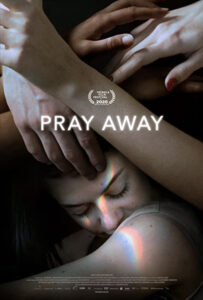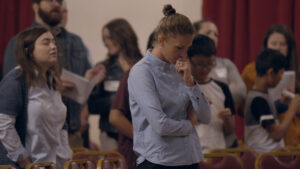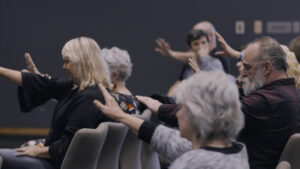AFI DOCS Review: “Pray Away” Examines the Dangerous Consequences of Conversion Therapy
Written by: Christopher Llewellyn Reed | July 7th, 2021

Pray Away (Kristine Stolakis, 2020) 3½ out of 4 stars.
“If your religion tells you it is OK to discriminate against anyone because of their race, ethnicity, gender, sexual expression, sexual identity, different religion, or any other manner of difference from you, maybe reconsider the values it is teaching you.” – this film critic
A sad disorder within certain religious communities is the belief that homosexuality and other non-heteronormative sexual expressions, even if not directly mentioned in the bible, are sinful and must not only be condemned, but corrected. While it would seem that one choice any member of the LGBTQ+ community might be able to freely make should they be in such a group is to leave, that’s not always so easy to do. Though some of us are deeply anti-tribal and either agnostic or atheistic, or part of more liberal congregations, those who were raised in more conservative groups and find fellowship and love beyond the anti-gay beliefs, it can no doubt be hard to abandon one’s former identity in favor of a new one. The unknown is frightening, adding to the quotidian stress of the human condition.
In Pray Away, Kristine Stolakis, making her documentary-feature debut, examines the history of what is known as “conversion therapy” (also called “reparative therapy”). This is where so-called psychiatrists, licensed or not, work with people who identify as gay (or trans) to bring them back to the godly path, as they see it. They “pray away the gay,” so to speak. Sadly, many leaders of this movement, past and present, are themselves LGTBQ+, fighting against what they perceive as the demons of a person they do not want to be. And so Stolakis interviews them, profiling their work and its damaging consequences. Many of these folks have eventually broken free from the yolk of their own oppression, and now, though living much happier lives as their genuine selves, must live with the burden of past misdeeds. Given that many of the “converted” either engage in self-harm or actually kill themselves, that burden is heavy, indeed.

Some of those we meet include Yvette Cantu Schneider, who lived “six years as a practicing lesbian” before being “saved” at 27. She would later work to help pass California’s infamous Proposition 8 (since overturned), which banned same-sex marriages. Today, she regrets her years of activism, and though she remains married to her husband, with whom she has had two daughters, she now considers herself bisexual. There is also Michael Bussee, co-founder of Exodus International, a non-profit organization founded in 1976 (and disbanded by its own leaders in 2013) that took as its mission to correct homosexual behavior. Bussee left in 1978, and has worked hard ever since to undo much of what he started.
Speaking of Exodus, one of its most famous alums is John Paulk, former chairman of the board. He and his ex-wife Anne both were major figures in the anti-gay movement; his unhappiness eventually brought him out of the closet, but she still remains. Paulk officially renounced his past work in 2013 and now lives much more peacefully as a proud gay man. The list goes on, among them Julie Rodgers, a once and former conversion star and once and former and once again lesbian whose wedding, to her beloved female partner, forms the spine of the piece.

We also encounter one of the movement’s current leaders, Jeffrey McCall, who started Freedom March, which bills itself (on its website) as “a diverse group of former LGBTQ individuals sharing our testimonies and celebrating freedom in Christ.” He was lost and now is found, renouncing his former life as a woman, reclaiming his manhood and doing his best to make sure no one repeats his mistakes, as he perceives them. We’ll see how long that lasts, for if one thing is clear from this devastating portrait of the cost of self-denial, very few people can continue to fight their innate nature without eventually breaking down. We are who we are. The world is beautiful, and beautifully diverse. To paraphrase my own favorite New Testament verse, Corinthians 13:13, the greatest thing we have to give in this universe is love. Give it freely, and without judgment. Amen to that.

